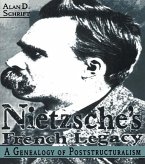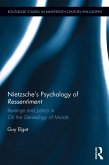In Nietzsche's Justice, Peter Sedgwick takes the theme of justice to the very heart of the great thinker's philosophy. He argues that Nietzsche's treatment of justice springs from an engagement with the themes charted in his first book, The Birth of Tragedy, which invokes the notion of an absolute justice grasped by way of artistic metaphysics. Nietzsche's encounter with Greek tragedy spurs the development of an oracular conception of justice capable of transcending rigid social convention. Sedgwick argues that although Nietzsche's later writings reject his earlier metaphysics, his mature thought is not characterized by a rejection of the possibility of the oracular articulation of justice found in the Birth. Rather, in the aftermath of his rejection of traditional accounts of the nature of will, moral responsibility, and punishment, Nietzsche seeks to rejuvenate justice in naturalistic terms. This rejuvenation is grounded in a radical reinterpretation of the nature of human freedom and in a vision of genuine philosophical thought as the legislation of values and the embracing of an ethic of mercy. The pursuit of this ethic invites a revaluation of the principles explored in Nietzsche's last writings. Smart, concise, and accessibly written, Nietzsche's Justice reveals a philosopher who is both socially embedded and oriented toward contemporary debates on the nature of the modern state.
Dieser Download kann aus rechtlichen Gründen nur mit Rechnungsadresse in A, B, BG, CY, CZ, D, DK, EW, E, FIN, F, GR, HR, H, IRL, I, LT, L, LR, M, NL, PL, P, R, S, SLO, SK ausgeliefert werden.









